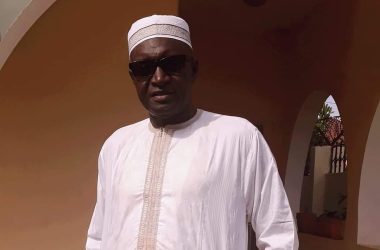To put it bluntly and simply, the Gambian environment is being ravaged thanks to both negligence and corruption by the Government. Since 2017, the destruction of the land, sea, beaches, forests, wetlands, streams and waterways, and mangroves through pollution, encroachments, dumping, bush fires, and de-gazetting continue unabated and without protection by the Government.
The Gambia has all the necessary laws, policies and institutions to protect and preserve the environment. But this is not happening simply because the Gambia Government is neither willing nor pressured to do its work as it should.
Instead, this Government has encouraged the destruction of the environment from Banjul to Basse thereby putting the country under severe climate change conditions while undermining lives and livelihoods.
The increasing floods Gambians face and the depletion of our fishes, reduction of forest covers, and blockage of water ways are all apparent to see.
The Gambia Government itself is all too aware of the dire conditions facing the country’s environment. Evidence of this can be found in the Ministry of Environment, Climate Change and Natural Resources’, policy document entitled the ‘Long-Term Climate-Neutral Development Strategy 2050’. On greenhouse gas emissions, the Strategy noted that, “more than 60% of the emission in this sub-sector comes from firewood, which puts an intense pressure on the forest thus aggravating deforestation.”
Both the Government and independent environmental experts and institutions have noted that the Gambia’s forest cover is fast reducing. Yet no effective action is being taken to address this menace when the Government has all the necessary laws to enforce.
These include the Forestry Act 2018, the Wildlife Life Conservation Act 1977, the National Environmental Management Act 1994, Biodiversity Act 2003 and their various regulations and policies.
Therefore, the question is, why is the Government not only failing to enforce these laws, but also it goes ahead to take decisions that endanger the environment such as de-reserving or de-gazetting forest parks?
For example, in 2023 the Government de-gazetted portions of the Nyanaberi and Bijilo forest parks. Earlier in 2019, the Government attempted to de-gazette part of Salaji Forest which was met with huge outcry.
In fact, a group comprising former ministers, directors and senior officials in the forestry and environment sectors had to write an open letter to President Barrow to appeal to him to stop such an attempt. What is even more scandalous is the fact that the Government was going to de-gazette a national forest to give it to foreign businesses! Today one could see various structures built in that forest, not knowing if the de-gazetting took place or not. So Abuko is not the first!
Meanwhile, the Government has allowed businesses to invade and construct warehouses in the Tanbi wetland area, and a petrol station on the beach in Banjul. Further, they have allowed massive sand mining to take place around the Denton Bridge area affecting thousands of mangroves and coconut trees.
Reserved lands and protected sanctuaries and wetlands along the Bertil Harding Highway to Kotu as well as in Kamalo have been handed over to businesses in total disregard of the country’s domestic and international obligations in environmental protection.
These are not allegations but the Government itself has noticed the seriousness of the matter that in October 2023, it suspended all developments in the Bertil Harding Highway and Kotu Institutional Layout as announced by the Government Spokesman Ebrima Sankareh.
In July 2024, the Minister of Lands Hamat Bah inaugurated two task forces to investigate illegal encroachments within the Tanbi Wetlands in Jeshwang and Cape Point, and encroachments within the government designated layouts or reserved lands. We have yet to see their reports. Why should these encroachments happen in the first place? Who made these allocations other than the Government itself?
Drive along the Salaji, Kabafita, Nyambai and Furuya forests to see the indiscriminate dumping and cutting down of trees in total contravention of Anti-Littering Regulation 2007. Above all, one can notice how portions of these forests are cut out for the construction of various kinds of structures by public institutions and private businesses. One example is a truck weigh station in Furuya Forest in Kembujeh.
This is the same scenario in Monkey Park where a huge portion was cut out to build the Kairaba conference centre. By this trend, it is obvious that it is just a matter of time when all these forest parks will be consumed by public institutions and private businesses.
Meantime, apart from the pollution being caused by fish meal factories to sea, land and mangroves in the Kombo coastal towns and villages, these companies are equally depleting the Gambia’s fish stock in full glare of the Government.
There has been ample evidence of this destruction by assessments by both NEA and other independent bodies which are being ignored. Rather these foreign companies are encouraged and protected.
The mismanagement of reserved and state lands in this country should concern citizens. For example, we have seen the former and current ministers of lands Musa Drammeh and Hamat Bah respectively distribute state lands illegally to state and non-state officials from 2017 to date.
Furthermore, reserved lands have been indiscriminately distributed to individuals and business such that the same Minister Hamat Bah announced in June 2024 that he has revoked 68 allocations, comprising 40 plots in Kamalo proper, and 28 plots in the Kamalo Extension. But until today, Hamat Bah has not released the full report of the taskforce. Why?

It is in this context that the so-called proposal by Minister Hamat Bah to de-reserve parts of Abuko Nature Reserve must be received with deep concern. Such a proposal is nothing new and indeed this Government has acted before to de-reserve forest parks already. Citizens must not be satisfied by the information that the proposal was rejected. Rather the question citizens must ask is why in the first place would Hamat Bah initiate such an idea? Is he not aware of the Gambia’s domestic and international obligations to protect and preserve the environment.
More seriously, is Hamat Bah not aware of the importance and status of Abuko Nature Reserve within the overall ecosystem and biodiversity of the Gambia such that he could not think of anything other than cutting a portion of it for a stadium?
The Gambia’s environment is already under severe threat thanks to the Government. A responsible government would have been seen seriously busy in taking all necessary steps to enforce laws to protect the environment in fulfilment of its domestic, regional and international obligations. Instead since 2017, this Government has been rather taking deliberate decisions and actions to damage the environment.
I call on all citizens to stand up to defend our environment from being exploited for selfish interests against the interests of present and future generations of Gambians.
On my part, I will be submitting a request under the Access to Information Act 2021 to the Ministry of Lands to inquire about the details and reasons for Hamat Bah’s original proposal to de-reserve parts of Abuko Nature Reserve for public information. Citizens need to know which parts of the nature reserve are targeted, and for what purpose.
Furthermore, I will also request for the release of the full report of the multi-sectoral task force which was formed by the Ministry of Lands in 2023 to review the allocation of demarcated plots of land at the Kamalo industry layout.
Citizens have a right to know the findings and recommendations of the taskforce and the status of implementation by the Ministry of Lands.
For The Gambia Our Homeland




